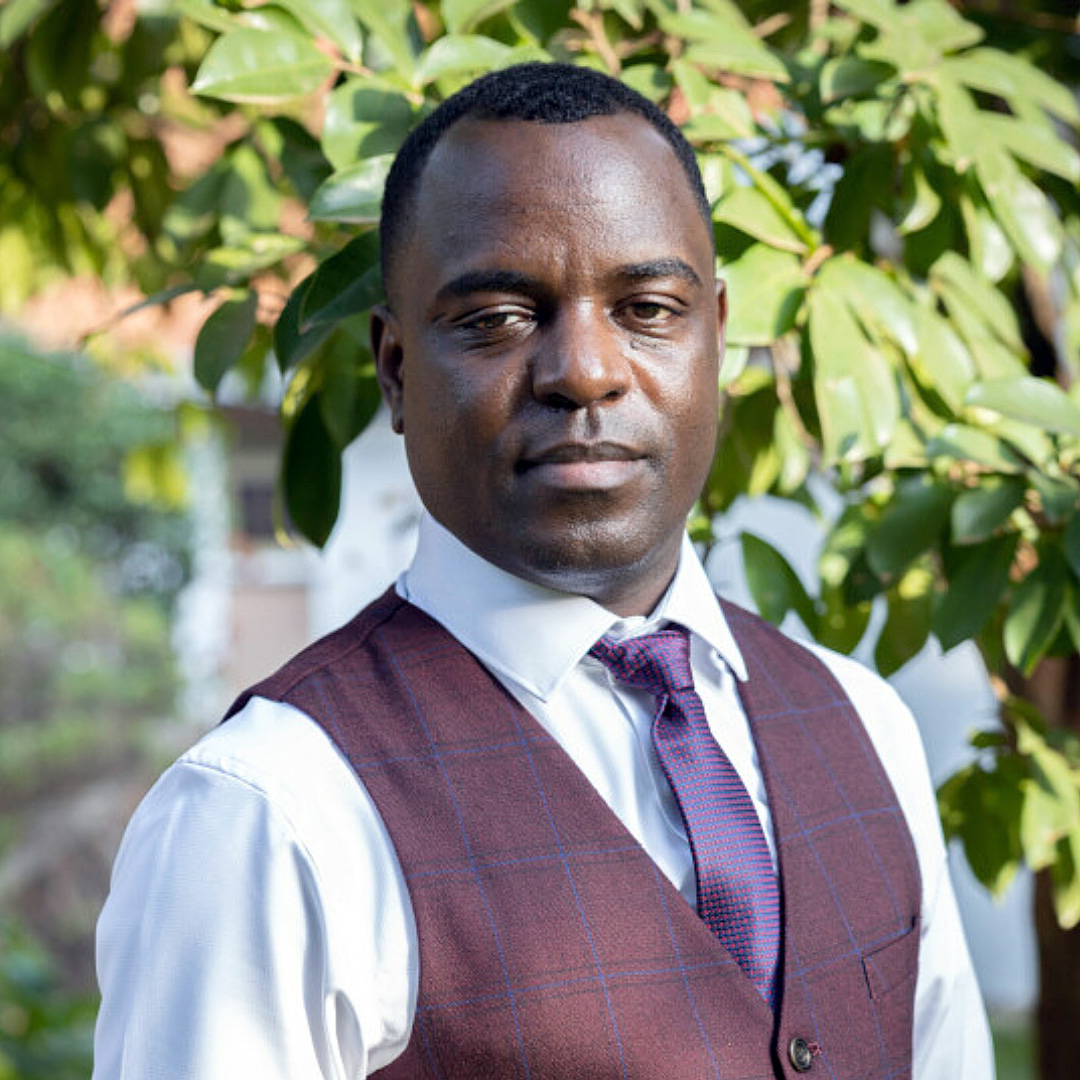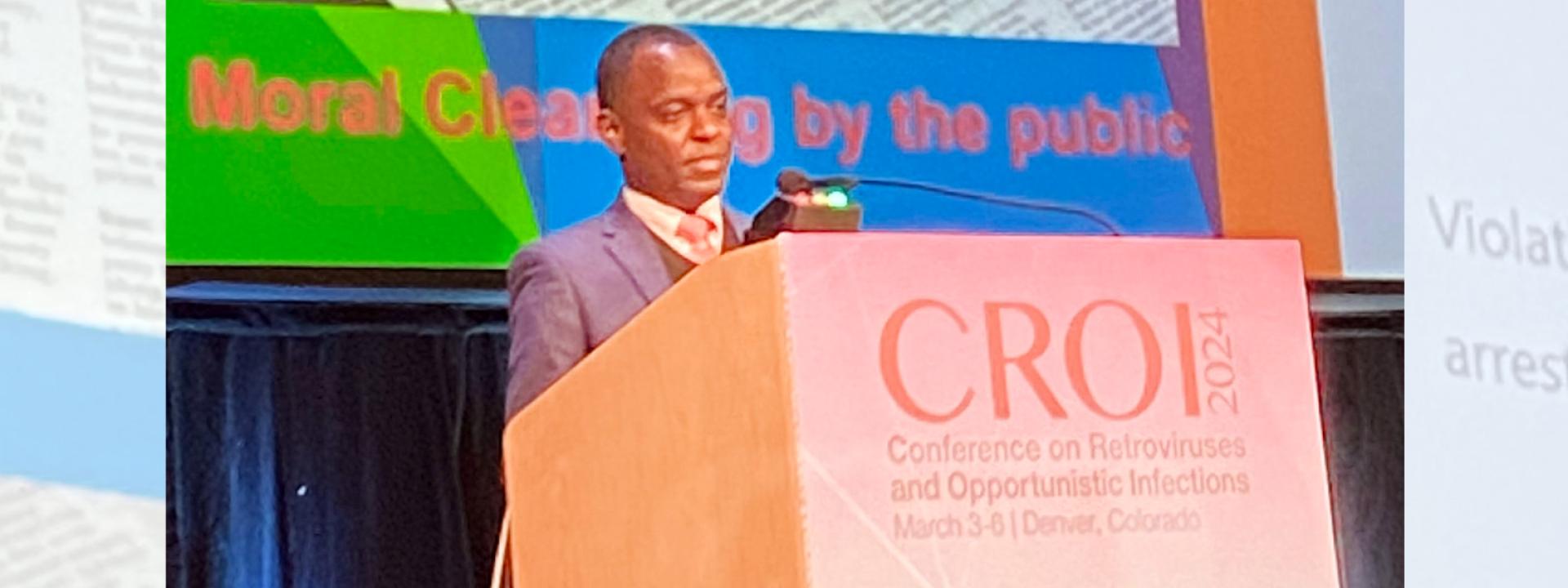Activists send letter to CROI organizers demanding action after many attendees leave early during speech by Ugandan gay activist
It’s not unusual at a big conference—especially a major medical or HIV conference like CROI (the Conference on Retroviruses and Opportunistic Infections)—that in a room with 1,000 or more attendees, people would start to get up and leave early as a plenary session draws to a close, or even as the last speaker takes the stage.
But this time was different.
At this year’s CROI, which just concluded, HIV activists are still angered that a significant number of attendees—many of them clinicians, researchers and other scientists—ducked out as HIV activist Dr. Frank Mugisha spoke about battling homophobia and laws that criminalize LGBTQ+ people in his home country, Uganda, and around the world, including the United States.
Activists sent a letter to organizers of the conference, CROI Foundation, IAS-USA, as well as to the CROI Scientific Planning Committee and the Community Liaison Subcommittee, calling on them to “clearly and unequivocally condemn this appalling lack of respect for community lives. We demand a direct apology to Dr. Frank Mugisha.”
The letter details the incident. “This year’s opening plenary at CROI, which took place Sunday evening March 3 in Denver, Colorado, included talks from Dr. Barney S. Graham, who spoke about modern vaccinology and the legacy of HIV research, and Dr. Dorothy Mboir-Ngacha, who reflected on ending pediatric HIV.”
The final speaker was Dr. Mugisha, whose powerful speech drew a standing ovation.
“Sadly, the audience was significantly smaller than the audience for the other lectures,” the letter says. “When it was Dr. Mugisha’s turn to speak, hundreds of researchers at the foremost scientific HIV conference in the world got out of their chairs, turned around, and walked out.”
Devan Nambiar, director of GHIS in Toronto, Canada, was at the plenary. “I was sitting at the back,” he said in an email to Positively Aware. “It was shocking to see many researchers and scientists casually walk out the moment Dr. Frank Mugisha started to speak. This was extremely rude, shameful, and homo/bi/transphobic behavior on the part of researchers and scientists. Many of the Ugandan LGBTQ+ people living with HIV, and various health issues, are not able to access basic health care and medication and live in fear of violence, being fired from jobs, and being evicted. What do equity, diversity, inclusion and accessibility mean when people most marginalized have no access to basic health care and life-saving antiretroviral medication to reduce deaths and end the HIV epidemic globally? Would it be too much to ask HIV researchers and scientists for 20 minutes to listen to a worthy cause to reduce HIV health disparities by one of the most well-known LGBTQ+ and HIV activists in the world?”

Frank Mugisha is one of the most prominent advocates for LGBTQ+ rights in Uganda
One of the most visible advocates for LGBTQ+ rights in Uganda, Dr. Mugisha, 45, is executive director of Sexual Minorities Uganda (SMUG). His activism earned him the Robert F. Kennedy Human Rights Award and the Thorolf Rafto Memorial Prize in 2011.
Many of the letter’s authors are advocates who worked with conference organizers.
“As members of the CROI Community Educator Scholars and Mentors, who officially represent community at CROI, we are appalled at the actions of these hundreds of HIV researchers,” the letter says. “Their behavior was shameful, unprofessional, and unacceptable. The message they sent was one of disdain and contempt for the community of people directly impacted by HIV. Their message was also homophobic and deeply stigmatizing.
The letter continues, “These researchers are well aware of the disproportionate burden of HIV on gay and bisexual men, other men who have sex with men, and transgender individuals in every part of the world. Yet they could not be bothered to give 20 minutes of their time to listen to Dr. Mugisha, one of our world’s top activists who risks his life daily to fight back against homophobia, homo-hatred, and trans-hatred.”
The IAS-USA Secretariat, which organizes CROI, apologized to Dr. Mugisha sometime after the Sunday plenary and before the letter was delivered to them the following Wednesday, on March 6, according to Jim Pickett, one of the letter’s authors. Pickett led the writing of the letter, which was a group effort informed by the Community Educator Scholars and Mentors group and other advocates.
“Frank indicated he was pleased and then emphasized how much great feedback he received from various folks who saw the talk,” said Picket.
“This kind of disrespect is not new and happens all the time. Over and over,” Pickett said. “This time around was just the last straw, especially considering the context of the talk and world events.”
In May 2023 Uganda passed the Anti-Homosexuality Act, one of the most severe anti-LGBTQ+ laws in the world, stoking violent homophobia in the country. The law’s constitutionality is being challenged in Ugandan court. In late February, the parliament of Ghana passed its own anti-gay bill, but the country’s president has said he will wait for Ghana’s supreme court to rule on its legality before deciding to sign it.
The letter also calls for changing the speaker line up of the opening plenary, so the community speaker would appear either first or second, not last. This would help to ensure that conference attendees not only pay better attention but would the move would serve as a demonstration of overcoming stigma and the marginalization of people living with HIV.
“At these conferences, nearly every talk gives lip service to stigma as a barrier; that disinterest proves that it’s just that—lip service,” said Jeff Taylor, executive director of HARP-PS (HIV+Aging Research Project - Palm Springs) and one of the letter’s co-authors. “This is nothing new at science meetings. All too often the community presentation—if they have one at all—is at the end and people leave before it starts. Which is why we’re asking that, going forward, they schedule them at the beginning or in the middle.”
Coming from Istanbul, Türkiye (formerly Turkey), Arda Karapinar, founder of the Red Ribbon Association of Istanbul, offered his own observations in an email to Positively Aware. “Especially at a conference like CROI, where community participation is so important, the fact that scientists at all levels so easily dismiss the community’s problems, their responses to them, and the community’s agenda, shows that something is wrong,” he said. “As community representatives from all over the world, we respect scientists and we do our best to make their work more effective and reach more people, so I think it is not too much to expect the same from all scientists in this field and to expect them to listen to our words.
“We are here,” he added. “We will continue to be here. We will continue to work passionately and speak from the heart. And if we are to achieve a global common goal of shared success on HIV, it is a necessity, not a choice, that scientists heed all this.”
The letter’s authors have posted their letter to change.org, urging people to show their support.


